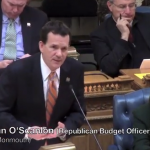O’Scanlon releases detailed plan to cap property tax hikes and save cops and firefighters jobs
TRENTON, N.J. – A month after releasing his report of the Arbitration Award Task Force that recommends permanently extending the cap, Assemblyman Declan O’Scanlon (R-Monmouth) proposed a comprehensive plan to ensure the policies continue to keep property taxes from rapidly increasing. He released the following statement:
“If we’re going to be honest, as effective policy makers it’s incumbent upon us to do the hard work, master the facts and policy nuances before us, and present cogent proposals to the public and the legislature. This list of policy proposals is me doing my job.
“The inescapable logic of permanently tying the arbitration award cap to the property tax cap isn’t hard to grasp. It is fourth-grade math. Any candidate or legislator who claims he needs ‘more information’ or that ‘all the facts aren’t in’ is feigning, in most cases, stupidity to avoid responsibility. Parents try to teach their children to reject such self-demoralizing choices.
“The huge price some are willing to pay for political success is both distressing and telling. Taxpayers shouldn’t let them get away with such cravenness. To fail to take a position on these policies before the election is an abdication of core transparency obligations of every elected official. And let’s be clear, this information – the report and these recommendations – isn’t anything new. They are simply an extension of the very report and recommendations we made back in 2014, and for which every member of the task force voted. The only difference now is the politics, which shouldn’t make a difference.
“I have heard some talk of ‘compromise’ on the cap. While I’m happy to discuss compromise on some aspects, compromise on the cap itself is like proposing compromise on the laws of mathematics. Sorry, legislators and potential governors aren’t imbued with such power. We can’t compromise that two plus two equals five.
“If the arbitration cap is allowed to sunset, it will ultimately result in the layoffs of cops and firefighters throughout New Jersey. The dissolution of the Lake Como police force, and attendant loss of police jobs, is the canary in a coal mine. Even with the cap in place, in times of fiscal stress police costs are the first examined and most impactful on municipal budget costs. The arbitration award cap must be kept in place to protect taxpayers and police and fire jobs. That’s the truth, despite whatever union leadership is telling its members.”
O’SCANLON’S MULTI-POINT PLAN TO MAKE ARBITRATION CAP PERMANENT AND WORKABLE
- Make the cap permanent without limitations before its expiration on Dec. 31, 2017. Given the spike in the number of petitions filed on the eve of the initial expiration in 2014, the Legislature should act well-before this expiration to avoid unnecessary professional costs.
- Continue to give arbitrators 90 days to render a decision. Increasing the number of days from 45 to 90 has helped address scheduling and unexpected issues that arise while concluding in an expeditious manner.
- Maintain the 14-day deadline to file an appeal and 60-day period for a final PERC decision.
- Keep arbitrator compensation capped at $10,000. This figure continues to accurately reflect the workload of an interest arbitrator, while maintaining a reasonable cap on costs.
- Continue to compound the 2 percent cap each year over the length of the collective negotiations agreement. The arbitrator may decide to include compounding an award or the parties may agree to do so.
- Continue to include the cost of increments previously negotiated, such as step movement and longevity payments, when determining base salaries.
- Adopt proposal to require that full cost be publicly disclosed before contracts take effect. The new rule, proposed by The Local Finance Board in July, creates a form patterned after the PERC summary showing salary costs along with significant cost drivers, such as step increases, longevity and employer health insurance premium costs. Governing bodies would need to make the information publicly available at least 7 days before a contract is considered and be publically advertised at least 3 days earlier. Failure to do either would void the agreement ratification pursuant to the statute.
- Void final agreements not filed with PERC or that don’t contain a cost summary. The current statute requires PERC to post negotiated agreements and a summary of all costs on its website. As there is no enforcement provision for compelling local governments or school districts to submit labor contracts, compliance with these requirements is uneven at best.
- Abolish “dynamic status quo” step increases. The doctrine of the “dynamic status quo” under case law permits step increases after a collectively negotiated agreement has expired. This doctrine should be abolished and salary guides and related steps should be suspended when a contract expires. This will encourage parties to negotiate successor agreements in a timely fashion while limiting salary progression to only those periods controlled by a valid contract. Continuing salary increments and longevity payments after a contract expires causes either unions to prematurely resort to arbitration, or local governments seek to recoup increments already paid after a contract is settled.









